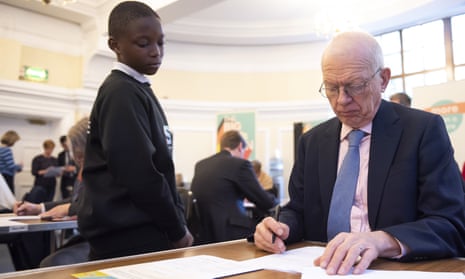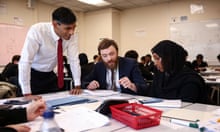MPs and peers tasked with completing a year 6 Sats exam have scored lower results on average than the country’s 10-year-olds.
MPs including Commons education select committee chair Robin Walker took part in the exams, invigilated by 11-year-olds, at a Westminster event organised by More Than A Score, who campaign for the tests to be scrapped.
Only 44% of the cross-party group of parliamentarians dubbed the Westminster Class of 2022 achieved the expected standard in maths and just 50% had achieved the expected standard in spelling, punctuation and grammar.
Across the country, 59% of pupils aged 10 and 11 reached the expected standard in the Sats tests of maths, reading and writing this year, down from 65% in 2019, the previous time the tests were taken. Detailed figures published by the Department for Education in the summer revealed disadvantaged children had a steeper fall than their better-off peers.
Walker took part in the Big SATS Sit-In Westminster alongside his Conservative colleagues Flick Drummond and Gagan Mohindra; Labour MPs Ian Byrne and Emma Lewell-Buck with the Green party’s Lady Bennett to experience the high-stakes nature of the exams. More Than A Score hope the politicians will take the high-pressured experience away with them and realise that “the exams only judge schools but do not help children’s learning” at that age.
“The exams were absolutely terrifying,” Byrne said, “the mental impact such pressure would have on these young children is immense. Sats at this level must be scrapped. I’m delighted so many cross-party colleagues could experience this pressure too.”
Walker, the new chair of the education select committee acknowledged a need to reform exams for 10 to 11-year-olds, but refused to back dropping the exams altogether. “There will always be a place for testing but that cannot be the be-all and end-all to accessing the most opportunity. Ultimately, it’s not just about testing but it’s how we develop their love of reading.”
His comments were welcomed by Drummond who said a lot of the terminology used in the grammar exam was “unnecessary”. “We should have assessments but they shouldn’t be at such high stakes, wasting six months or more. It was quite a hard test and we need to acknowledge what will actually be useful for the future. We’re not educating young people to pass tests, we should want to give them a love of learning.”
A YouGov poll commissioned for the campaign group found 8% of parents and headteachers agreed that preparing for Sats and other tests should be the bottom of their priorities in the classroom. It also found 60% of parents felt intense nature of the exams harmed children’s mental health.
after newsletter promotion
Alison Ali from More Than A Score said: “This is more than a test of maths and English capabilities, it’s an opportunity for MPs to put themselves in the shoes of 10 and 11-year-olds … they will see how absurd some of the questions faced by children are, how these absurdities influence and narrow the whole curriculum and how they are only used to judge schools not to help children’s learning.”










